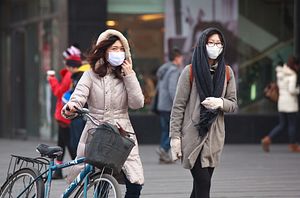Nearly a year ago, Pacific Money considered the issue of a possible “health drain” with regard to China. At the time, uncertainty about a new H7N9 outbreak was ongoing, and the infamous “Airpocalypse” was still in the news.
This year, while the H7N9 fear has turned out to be unfounded for now, the continuing battle against pollution has been having a definite economic effect – and not just in terms of health costs and lost work capacity. This last week, at least one company began to quantify it.
Panasonic, the Japanese electronics firm, announced that it would begin paying foreign staff working in China a pollution premium on top of their usual salaries. This is the first time that a company has explicitly identified pollution as a factor in fixing its compensation.
Details of the payments remain unclear, but the news is certainly not good for China. Pollution is not going to drive companies out (as it does with individuals), but it will certainly raise the costs of doing business in the country. If other companies follow Panasonic’s example, then it will represent a further erosion of China’s competitiveness, already under pressure as the country’s labor market matures and costs increase.
While many companies offer hardship premiums and benefits for staff who are sent to China, the identification of pollution as a contributing factor to this “hardship” is a new phenomenon.
Only a few days earlier, China’s deputy minister for environmental protection Wu Xiaoqing revealed that only three out of 74 major cities met national air quality standards in 2013.
The Guardian reported that in China, “Levels of PM 2.5 have repeatedly reached more than 400 micrograms per cubic metre, according to a count by the US embassy in Beijing, more than 16 times the World Health Organisation’s (WHO) safety guideline of 25 micrograms.”
Indeed, here in Beijing, pollution levels that would still be regarded as unsafe by the WHO are usually welcomed as a relief from bouts of heavy pollution that affect the capital. Wu Xiaoqing’s admission also identified the Beijing-Tianjin-Hebei areas as the worst in the country.
Wu also announced plans for the government to spend RMB 5 trillion ($817 billion) on the pollution fight over the 2011-2015 period. Worryingly, almost half of this has already been spent.
With many rich Chinese moving abroad (taking their assets with them), citing pollution as one of the main reasons for leaving, this latest news from Panasonic merely undermines the fact that China’s pollution problem is costing the country dearly. Perhaps the government’s budget for this fight needs to be increased. After all on the plus side, and in the slightly perverse system by which GDP is calculated, money spent cleaning up pollution is actually positive for growth!

































